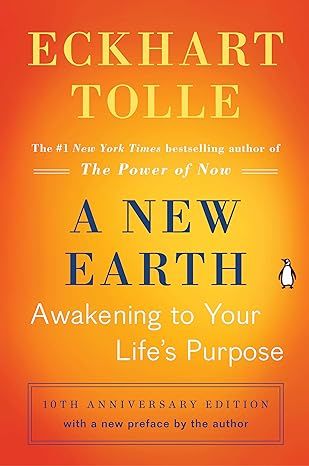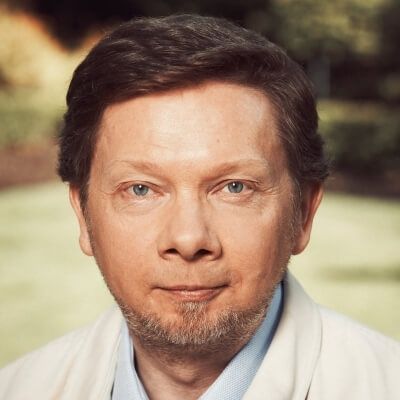A New Earth: Awakening to Your Life's Purpose (Oprah's Book Club, Selection 61)
4.7
-
18,620 ratings
#1 NEW YORK TIMES BESTSELLER
“A wake-up call for the entire planet . . . [A New Earth] helps us to stop creating our own suffering and obsessing over the past and what the future might be, and to put ourselves in the now.” —Oprah Winfrey
With his bestselling spiritual guide The Power of Now, Eckhart Tolle inspired millions of readers to discover the freedom and joy of a life lived “in the now.” In A New Earth, Tolle expands on these powerful ideas to show how transcending our ego-based state of consciousness is not only essential to personal happiness, but also the key to ending conflict and suffering throughout the world. Tolle describes how our attachment to the ego creates the dysfunction that leads to anger, jealousy, and unhappiness, and shows readers how to awaken to a new state of consciousness and follow the path to a truly fulfilling existence.
Illuminating, enlightening, and uplifting, A New Earth is a profoundly spiritual manifesto for a better way of life—and for building a better world.
Kindle
$14.99
Available instantly
Audiobook
$0.00
with membership trial
Hardcover
$16.94
Paperback
$7.99
Ships from
Amazon.com
Payment
Secure transaction
ISBN-10
0452289963
ISBN-13
978-0452289963
Print length
336 pages
Language
English
Publisher
Penguin
Publication date
January 29, 2008
Dimensions
5.3 x 0.69 x 7.93 inches
Item weight
12 ounces
Popular highlights in this book
Life will give you whatever experience is most helpful for the evolution of your consciousness. How do you know this is the experience you need? Because this is the experience you are having at this moment.
Highlighted by 15,327 Kindle readers
The primary cause of unhappiness is never the situation but your thoughts about it.
Highlighted by 13,376 Kindle readers
Nonreaction to the ego in others is one of the most effective ways not only of going beyond ego in yourself but also of dissolving the collective human ego.
Highlighted by 12,824 Kindle readers
Nonresistance, nonjudgment, and nonattachment are the three aspects of true freedom and enlightened living.
Highlighted by 11,755 Kindle readers
Whenever you feel superior or inferior to anyone, that’s the ego in you.
Highlighted by 11,470 Kindle readers
Product details
ASIN :
0452289963
File size :
1574 KB
Text-to-speech :
Enabled
Screen reader :
Supported
Enhanced typesetting :
Enabled
X-Ray :
Enabled
Word wise :
Enabled
Editorial reviews
Praise for Eckhart Tolle and his work
"[Oprah] Winfrey calls the book 'a wake-up call for the entire planet, one reader at a time. It helps us to distance ourselves from our egos . . . and to open ourselves to a higher self. . . . It helps us to stop creating our own suffering and obsessing over the past and what the future might be, and to put ourselves in the now.'" —USA Today
"I would do anything to be anywhere in the vicinity of Eckhart Tolle." —Jim Carrey
"A gentle journey, one that could take you to a spectacular and very special place of new awareness and deeper understanding." —Neale Donald Walsh, author of Conversations with God
"One of the best books to come along in years. Every sentence rings with truth and power—the power to bring you into the gap, the space between our thoughts, where we find, as Eckhart so beautifully puts it, deep serenity, stillness, and a sacred Presence." —Deepak Chopra, author of The Seven Spiritual Laws of Success
Sample
The Flowering of Human Consciousness
Evocation
Earth, 114 million years ago, one morning just after sunrise: The first flower ever to appear on the planet opens up to receive the rays of the sun. Prior to this momentous event that heralds an evolutionary transformation in the life of plants, the planet had already been covered in vegetation for millions of years. The first flower probably did not survive for long, and flowers must have remained rare and isolated phenomena, since conditions were most likely not yet favorable for a widespread flowering to occur. One day, however, a critical threshold was reached, and suddenly there would have been an explosion of color and scent all over the planet—if a perceiving consciousness had been there to witness it.
Much later those delicate and fragrant beings we call flowers would come to play an essential part in the evolution of consciousness of another species. Humans would increasingly be drawn to and fascinated by them. As the consciousness of human beings developed, flowers were most likely the first thing they came to value that had no utilitarian purpose for them, that is to say, was not linked in some way to survival. They provided inspiration to countless artists, poets, and mystics. Jesus tells us to contemplate the flowers and learn from them how to live. The Buddha is said to have given a "silent sermon" once during which he held up a flower and gazed at it. After a while, one of those present, a monk called Mahakasyapa, began to smile. He is said to have been the only one who had understood the sermon. According to legend, that smile (that is to say, realization) was handed down by twenty-eight successive masters and much later became the origin of Zen.
Seeing beauty in a flower could awaken humans, however briefly, to the beauty that is an essential part of their own innermost being, their true nature. The first recognition of beauty was one of the most significant events in the evolution of human consciousness. The feelings of joy and love are intrinsically connected to that recognition. Without our fully realizing it, flowers would become for us an expression in form of that which is most high, most sacred, and ultimately formless within ourselves. Flowers, more fleeting, more ethereal, and more delicate than the plants out of which they emerged, would become like messengers from another realm, like a bridge between the world of physical forms and the formless. They not only had a scent that was delicate and pleasing to humans, but also brought a fragrance from the realm of spirit. Using the word "enlightenment" in a wider sense than the conventionally accepted one, we could look upon flowers as the enlightenment of plants.
Any life-form in any realm—mineral, vegetable, animal, or human—can be said to undergo "enlightenment." It is, however, an extremely rare occurrence since it is more than an evolutionary progression: It also implies a discontinuity in its development, a leap to an entirely different level of Being and, most importantly, a lessening of materiality.
What could be heavier and more impenetrable than a rock, the densest of all forms? And yet some rocks undergo a change in their molecular structure, turn into crystals, and so become transparent to the light. Some carbons, under inconceivable heat and pressure, turn into diamonds, and some heavy minerals into other precious stones.
Most crawling reptilians, the most earthbound of all creatures, have remained unchanged for millions of years. Some, however, grew feathers and wings and turned into birds, thus defying the force of gravity that had held them for so long. They didn't become better at crawling or walking, but transcended crawling and walking entirely.
Since time immemorial, flowers, crystals, precious stones, and birds have held special significance for the human spirit. Like all life-forms, they are, of course, temporary manifestations of the underlying one Life, one Consciousness. Their special significance and the reason why humans feel such fascination for and affinity with them can be attributed to their ethereal quality.
Once there is a certain degree of Presence, of still and alert attention in human beings' perceptions, they can sense that there is more there than the mere physical existence of that form, without knowing that this is the reason why he or she is drawn toward it, feels an affinity with it. Because of its ethereal nature, its form obscures the indwelling spirit to a lesser degree than is the case with other life-forms. The exception to this are all newborn life-forms—babies, puppies, kittens, lambs, and so on. They are fragile, delicate, not yet firmly established in materiality. An innocence, sweetness and beauty that are not of this world still shine through them. They delight even relatively insensitive humans.
So when you are alert and contemplate a flower, crystal, or bird without naming it mentally, it becomes a window for you into the formless. There is an inner opening, however slight, into the realm of spirit. This is why these three "en-lightened" life-forms have played such an important part in the evolution of human consciousness since ancient times; why, for example, the jewel in the lotus flower is a central symbol of Buddhism and a white bird, the dove, signifies the Holy Spirit in Christianity. They have been preparing the ground for a more profound shift in planetary consciousness that is destined to take place in the human species. This is the spiritual awakening that we are beginning to witness now.
The Purpose of This Book
Is humanity ready for a transformation of consciousness, an inner flowering so radical and profound that compared to it the flowering of plants, no matter how beautiful, is only a pale reflection? Can human beings lose the density of their conditioned mind structures and become like crystals or precious stones, so to speak, transparent to the light of consciousness? Can they defy the gravitational pull of materialism and materiality and rise above identification with form that keeps the ego in place and condemns them to imprisonment within their own personality?
The possibility of such a transformation has been the central message of the great wisdom teachings of humankind. The messengers—Buddha, jesus, and others, not all of them known—were humanity's early flowers. They were precursors, rare and precious beings. A widespread flowering was not yet possible at that time, and their message became largely misunderstood and often greatly distorted. It certainly did not transform human behavior, except in a small minority of people.
Is humanity more ready now than at the time of those early teachers? Why should this be so? What can you do, if anything, to bring about or accelerate this inner shift? What is it that characterizes the old egoic state of consciousness recognized? These and other essential questions will be addressed in this book. More important, this book itself is a transformational device that has come out of the arising new consciousness. The ideas and concepts presented here may be important, but they are secondary. They are no more than signposts pointing toward awakening. As you read, a shift takes place within you.
This book's main purpose is not to add new information or beliefs to your mind or to try to convince you of anything, but to bring about a shift in consciousness, that is to say, to awaken. In that sense, this book is not "interesting." Interesting means you can keep your distance, play around with ideas and concepts in your mind, agree or disagree. This book is about you. It will change your state of consciousness or it will be meaningless. It can only awaken those who are ready. Not everyone is ready yet, but many are, and with each person who awakens, the momentum in the collective consciousness grows, and it becomes easier for others. If you don't know what awakening means, read on. Only by awakening can you know the true meaning of that word. A glimpse is enough to initiate the awakening process, which is irreversible. For some, that glimpse will come while reading this book. For many others who may not even have realized it, the process has already begun. This book will help them recognize it. For some, it may have begun through loss or suffering; for others, through coming into contact with a spiritual teacher or teaching, through reading The Power of Now or some other spiritually alive and therefore transformational book—or any combination of the above. If the awakening process has begun in you, the reading of this book will accelerate and intensify it.
An essential part of the awakening is the recognition of the unawakened you, the ego as it thinks, speaks, and acts, as well as the recognition of the collectively conditioned mental processes that perpetuate the unawakened state. That is why this book shows the main aspects of the ego and how they operate in the individual as well as in the collective. This is important for two related reasons: The first is that unless you know the basic mechanics behind the workings of the ego, you won't recognize it, and it will trick you into identifying with it again and again. This means it takes you over, an imposter pretending to be you. The second reason is that the act of recognition itself is one of the ways in which awakening happens. When you recognize the unconsciousness in you, that which makes the recognition possible is the arising consciousness, is awakening. You cannot fight against darkness. The light of consciousness is all that is necessary. You are that light.
Read more
About the authors
Eckhart Tolle
Eckhart Tolle was born in Germany. When he was 29, a profound spiritual transformation virtually dissolved his old identity and radically changed the course of his life. He is now a counsellor and spiritual teacher, and the author of The Power of Now, Practising the Power of Now and Stillness Speaks. He lives in Vancouver.
Reviews
Customer reviews
4.7 out of 5
18,620 global ratings
W. Donovan
5
This is a Helpful Book
Reviewed in the United States on August 5, 2011
Verified Purchase
In A New Earth, Eckhart Tolle draws from the teaching of many religious leaders. Instead of focusing on religious traditions Tolle focuses primarily on what William James would call religious personalities, and Tolle is undoubtedly one himself.
Quoting William James in regards to religious personalities: "Thus, when a superior intellect and a psychopathic temperament coalesce - as in the endless permutations and combinations of human faculty, they are bound to coalesce often enough- in the same individual, we have the best possible condition for the kind of effective genius that gets into the biographical dictionaries. Such men do not remain mere critics and understanders with their intellect. Their ideas possess them, they inflict them, for better or worse, upon their companions or their age."
Tolle borrows heavily from the teachings of two figures you are already familiar with: Jesus and Buddha, and also delves into Zen Buddhism, Hinduism, and Christian Gnosticism. Almost everyone is familiar with these figures and movements, and that familiarity makes his message very accessible.
Tolle, however, also draws upon another stranger tradition, one that has its roots in the Theosophical school of Madame Blavatsky, namely through the work and teaching of Jiddu Krishnamurti. Krishnamurti is an interesting figure, he lived recently and there are youtube videos of him giving public lectures and being interviewed. He advocates some of the same fundamental concepts as Tolle, for instance, the focus on being present is one of the main concerns of both men. If you haven't read either of them, the idea of being present is a great concept, and one that I use in my life.
Basically, being present just means focusing on your senses and surroundings, rather than focusing on your inner monologue. For instance, and this is a paraphrase, Tolle asserts that there is no such thing as a problem when you are present, just a situation. Most of us can handle complicated situations, but complicated problems wear us down and destroy us. Therefore, a simple shift of perspective regarding how you view time can change the way you live from being based in problems - into being based in situations. This was a fundamental improvement in my life.
An idea that Tolle doesn't mention specifically but probably influenced him is Krishnamurti's teaching that the things you feel are you. That's deceptively simple, but he gives a good example based on the emotion of fear. When you experience fear, you feel as though something is making you afraid. On closer examination, however, the fear is located completely within your own body and thoughts. This is an interesting point, because if the fear and you are identical, can't you manage the fear?
They both also make fascinating points regarding what it means to enjoy life. How experiencing something by giving it your full attention is the way to be happy, as opposed to wanting to own and control things - which is really the desire for permanence. Desiring permanence is a rabbit hole that leads to unhappiness and not actually experiencing anything, because you are always wanting more and not focusing on what you do have. They both explain this better.
This is a really great book. If you are interested in further reading check out books by Jiddu Krishnamurti (a bunch are on audible audio books for like 6 bucks), although Krishnamurti is not nearly as entertaining or understandable he makes some life changing points if you are willing to ruminate with the texts.
Read more
8 people found this helpful
Alok
5
Insights into Human Consciousness.
Reviewed in the United States on June 1, 2024
Verified Purchase
Amazing book for people who are exploring human consciousness and has awakened inside partially or fully or looking into the process. It gives insights into a different dimension within Human beings and helps with the shift from Form to Formless.Its high time for humans to act with awakened consciousness which is more holistic approach rather than a self centered one which is destroying the Planet. Looking forward to a New Earth and more Participation in the process.
Read more
Stephen V. Riley
5
The Human Ego, The Original Sin of Humankind.
Reviewed in the United States on October 3, 2009
Verified Purchase
Eckert Tolle's book "A New Earth" hardly needs another Amazon book review considering the 1,451 that have been submitted so far. After reading a number of the reviews, I was startled by the extraordinary esoteric thinking of many the reviewers. This is hardly typical of the average American mind. It appears the "New Age" movement has grown exponentially and it demonstrates the immense hunger for spirituality that has been so suppressed in American culture. In a way, this is sad because it represents a hunger that much of the institutional church is not fulfilling. The critical issue is that Christian spirituality is meant to be pro-active, generating the powerful forces of love, compassion, forgiveness and caring for others while the new secular spirituality can be extremely self-centered.
I have chosen to write this book review from the perspective a Catholic peace and social activist. Regardless, none of these reviews can substitute reading "A New Earth" because one needs to personally taste the absolute eloquence and powerful spiritual insights found in Eckhart Tolle's writing. Reading Eckhart Tolle is transformational. His writing is therapeutic. Chapter three, "The Core of Ego", is definitely a prime instructional source for good mental health. "A New Earth" is one of the most important books of our time. It needs to be read by all inquiring spiritual minds and those struggling to understand the increasing violence and insanity in the world.
Eckhart Tolle's book presents a clear understanding of human consciousness, profound spirituality and the beginnings of a radical and evolutionary awakening of a higher consciousness. To arrive at this higher consciousness, Eckhart Tolle delves deeply into the dysfunction of the human ego, both in the individual and in the institutions of power and wealth. To Eckhart Tolle, "The greatest achievement of humanity is not its works of art, science or technology, but the recognition of its own dysfunction, its own madness".
Eckhart Tolle states how the love of things can contribute to the domination of the human ego and how a consumer society honors material things as a means to self-enhancement.....it distorts our perception of reality and the true nature of our humanity.
To quote Eckhart Tolle: "Ego-identification with things creates attachment to things, obsession with things, which in turn creates our consumer society and economic structures where the only measure of progress is always more. The unchecked striving for more, for endless growth, is a dysfunction and a disease. It is the same dysfunction the cancerous cell manifests, whose only goal is to multiply itself, unaware that it is bringing about its own destruction by destroying the organism of which is a part".
With "A New Earth" chosen by the Oprah Book Club, and the numerous appearances of Eckhart Tolle on the Oprah Winfrey show, Oprah has played a big role in elevating the spiritual consciousness of hundreds of thousands of American readers. Oprah must be commended for this. As I understand it, more than any other book in recent history, this book was read and reviewed by the vast majority of book clubs in the U.S. I hope "A New Earth" will be the beginning of much needed maturity in American thinking and in American Christianity as well.
Yes, to me, Christianity in America needs to mature in a spiritual way if ever there is to be greater maturity in American culture. A higher spiritual consciousness is the essential element for radical social transformation. As Fr. Richard Rohr, of the Center for Action and Contemplation in Albuquerque, NM, would say, Christianity in America has become a belonging system, "us" against "them", rather than a system for personal transformation. The tragedy is that Christianity has become in some ways just another institution seeking its own perpetuation and power, dominated by the human ego.
The dysfunction of the human ego is what Christ tried so hard to get through to the minds of his disciples, particularly when he told Peter, the "first pope", to "get behind me you devil" (Mathiew 24,15) or "Why do you see the speck that is in your brother's eye, but do not notice the log that is in your own eye" (Mathew 7). Christ had the perfect non-dualistic mind.
In fact, addressing the human ego goes to the heart of all of the world's major religions, but Christianity seems to have walked away from it. Christianity chose to do so when it became part of the Roman Empire in 325 AD. Since then, Christianity has had a hard time critiquing the system and the unjust status quo that stems from the dysfunction of the human ego. Christianity has found it difficult to critique the system because it has become a part of the system. The culturally imprisoned mindset of many American Christians is totally contrary to the mind of Christ.
As mentioned, addressing the problem of the human ego goes to the heart of all of the world's major religions. But not often enough do religious or spiritual writers critique the institutions of corporate capitalism. Eckhart Tolle's book is most timely to stimulate a new national conversation, particularly when considering America's "never ending war" against terrorism and the near dictatorial powers of the U.S. Military Industrial Complex.
It is time U.S. citizens recognize that government propaganda in support of war and the interests of corporate capitalism is a force that strategically preys on the weaknesses of the human ego. Actually corporate capitalism can be said to be diabolical as it seeks to enrich itself by altering human consciousness. This then exaggerates the human ego that has led to a dysfunctional society. Eckhart Tolle never used the word "capitalism". Yet the underlying message of his writing is a severe critique of capitalism. I guess you could say the word "capitalism" has been "sanctified" in America, the unspoken word or the unseen elephant in the living room.
Eckhart Tolle avoids saying in a direct manner, "corporate capitalism is intrinsically evil and unsustainable" or "corporate consumer capitalism alters human consciousness and is the destroyer of the human spirit". You have to come to that conclusion yourself.
In March 2009, there was a conference at the Center of Action and Contemplation, Albuquerque, NM called "The Emerging Church: Christians Creating a New World Together". This conference was attended by a thousand people, about half of whom were Catholic, the rest were mainline and evangelical Protestants and other Christians. Many of those at the conference believed that the future of the church will be the coming together of like minded people from all denominations who seek a more prophetic and contemplative faith. A higher global consciousness that is seeking a more just, sustainable and compassionate world is already a powerful emerging force in the world. The "emerging church" seeks to be part of this higher social consciousness. It seeks to serve as praxis and as co-creator for the evolutionary destiny of humankind to consciously provide for the survival of it's own species. An increasing number of Christians view this higher consciousness as the universal consciousness of the risen Christ. To these Christians, the salvation and survival of humankind is what the death and resurrection of Christ is all about.
A more contemplative faith is about centering oneself in Presence, through meditation and contemplation, seeking wisdom through the gift of the Holy Spirit. This is done by embracing opposing thoughts and coming to spiritual discernment. Particularly for a Catholic activist, this centering of the human spirit is the critical means of overcoming personal anger when so involved in non-violent civic activism. Spiritual discernment goes to the heart of a healthy democracy as well. A healthy democracy is truly an act of the human spirit. Democracy is meant to work for the common good and to question the unjust status quo. This is why corporate capitalism hates democracy and seeks to destroy it with the total corruption of the U.S. Congress.
I see the teachings of scholars like Eckhart Tolle and the emerging church movement as bringing maturity to Christianity in the 21st Century. It is the coming together of like minded people of all faiths that see the human ego, enticed by the institutions of corporate capitalism, as being the prime cause of social unrest, the scapegoating of others and the waging of war. It cannot be denied, the oppression of global capitalism is the cause of the "blow-back" of terrorism. This blow-back from war and economic domination is in reality the powerful forces of spirituality at work, the liberation of the human spirit.
In meditation and contemplation, where we seek to separate ourselves from the dominance of the human ego, we can come to see what the Divine Spirit wants us to see, the holiness of all people, to understand our own brokenness and thus becoming able to forgive others with compassion.
Father Richard Rohr stated so well in a September 4, 2009 article in the National Catholic Reporter that another word for contemplation is non-dualistic thinking. "That's what makes people able to be merciful and forgiving. You can't love your enemies with a low level dualistic mind. It's impossible. You don't have the software to know how to do it. So we tell people to love your enemies. A normal Catholic can't do that with the software that he or she has been given. Catholics were never taught they need a different consciousness to understand the Gospel".
Read more
129 people found this helpful
Top Eckhart Tolle titles
View all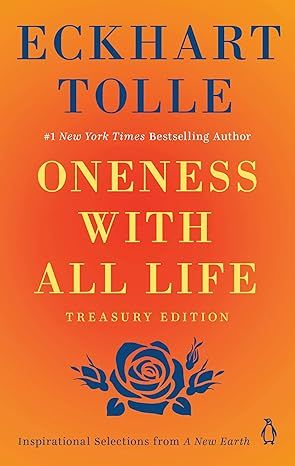
Oneness With All Life: Awaken to a life of purpose and presence with the Number One bestselling spiritual author
4.8
-
2,119
$9.99
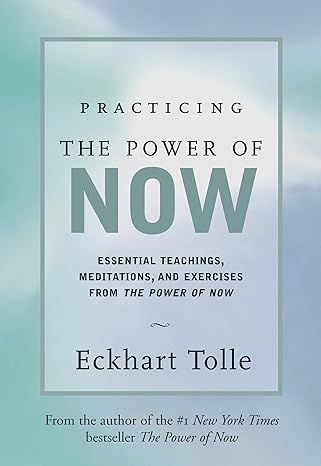
Practicing the Power of Now: Essential Teachings, Meditations, And Exercises From the Power of Now (16pt Large Print Edition)
4.7
-
5,712
$1.42
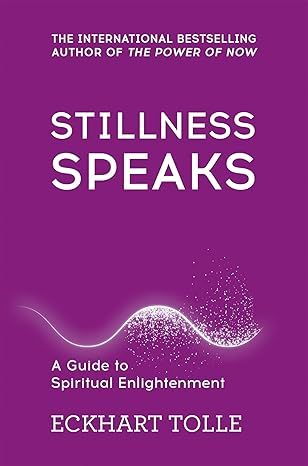
Stillness Speaks : Whispers of Now
4.7
-
6,345
$1.78
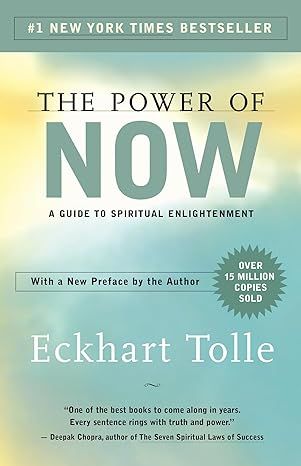
The Power of Now: A Guide to Spiritual Enlightenment
4.7
-
61,710
$1.77
Similar Books
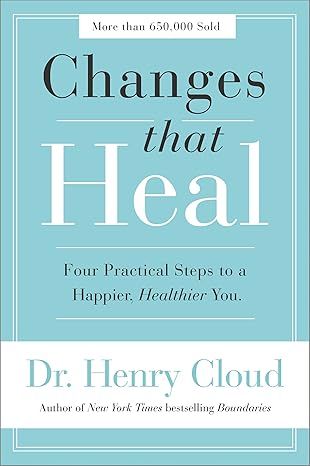
Changes That Heal: Four Practical Steps to a Happier, Healthier You
4.8
-
2,937
$0.99
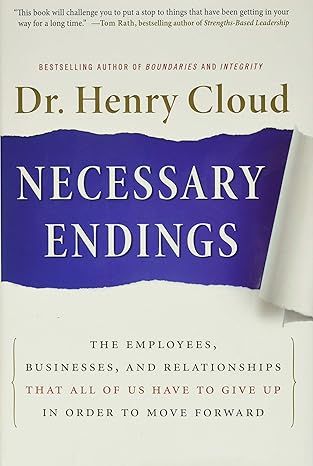
Necessary Endings: The Employees, Businesses, and Relationships That All of Us Have to Give Up in Order to Move Forward
4.7
-
2,598
$0.99
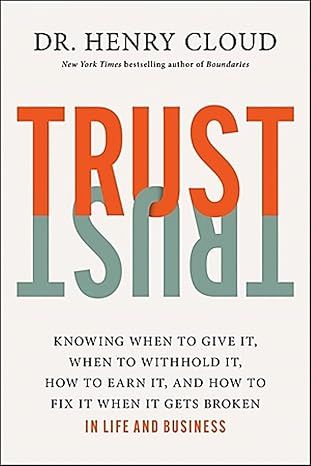
Trust: Knowing When to Give It, When to Withhold It, How to Earn It, and How to Fix It When It Gets Broken
4.8
-
626
$0.99
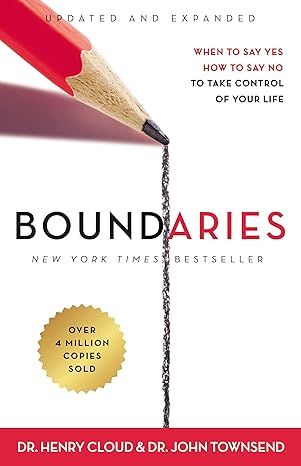
Boundaries Updated and Expanded Edition: When to Say Yes, How to Say No To Take Control of Your Life
4.7
-
23,877
$0.99
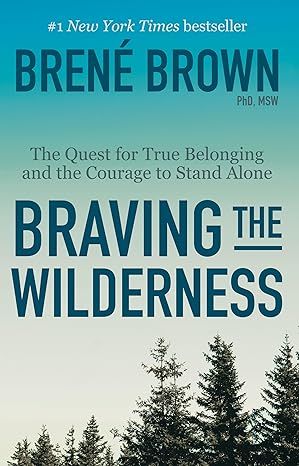
Braving the Wilderness: The Quest for True Belonging and the Courage to Stand Alone
4.6
-
14,403
$0.99
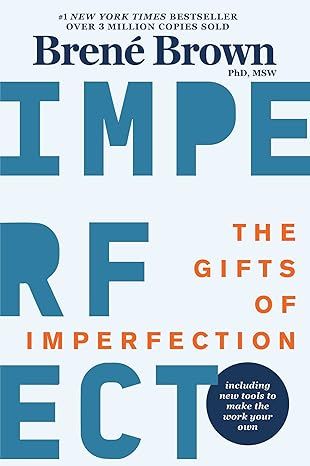
The Gifts of Imperfection: 10th Anniversary Edition: Features a new foreword and brand-new tools
4.7
-
42,318
$0.99
Best sellers
View all
The Tuscan Child
4.2
-
100,022
$8.39

The Thursday Murder Club: A Novel (A Thursday Murder Club Mystery)
4.3
-
155,575
$6.33

Sapiens: A Brief History of Humankind
4.6
-
140,302
$13.49

The Butterfly Garden (The Collector, 1)
4.3
-
88,556
$9.59

Things We Hide from the Light (Knockemout Series, 2)
4.4
-
94,890
$11.66

The Last Thing He Told Me: A Novel
4.3
-
154,085
$2.99

The Perfect Marriage: A Completely Gripping Psychological Suspense
4.3
-
143,196
$9.47

The Coworker
4.1
-
80,003
$13.48

First Lie Wins: A Novel (Random House Large Print)
4.3
-
54,062
$14.99

Mile High (Windy City Series Book 1)
4.4
-
59,745
$16.19

Layla
4.2
-
107,613
$8.99

The Locked Door
4.4
-
94,673
$8.53
